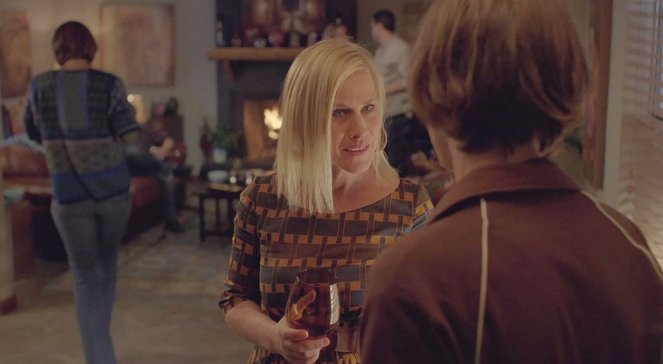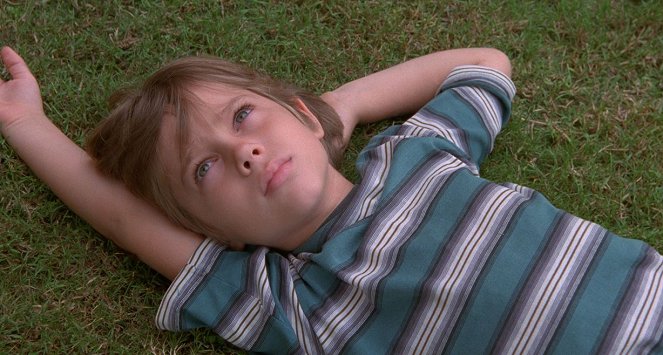Ohjaus:
Richard LinklaterKäsikirjoitus:
Richard LinklaterNäyttelijät:
Patricia Arquette, Ellar Coltrane, Lorelei Linklater, Ethan Hawke, Steven Chester Prince, Zoe Graham, Nick Krause, Evie Thompson, Tamara Jolaine (lisää)Suoratoistopalvelut (5)
Juonikuvaukset(1)
Richard Linklaterin (Rakkautta ennen aamua) uutuuselokuva Boyhood on elämänmakuinen kasvutarina, joka seuraa Masonin (Ellar Coltrane) varttumista pojasta nuoreksi mieheksi. Ajan kulun voi aistia valkokankaalla ainutlaatuisella tavalla, sillä elokuvaa on kuvattu 12 vuoden ajan samojen näyttelijöiden kanssa. 6-vuotiaan Masonin elämässä on tapahtumassa suuria ja hämmentäviä muutoksia: hänen yksinhuoltajaäitinsä Olivia (Patricia Arquette) on päättänyt, että perhe, johon kuuluu myös isosisko Samantha (Lorelei Linklater), muuttaa toiseen kaupunkiin. Samaan aikaan hänen pitkään Alaskassa asunut isänsä (Ethan Hawke) tekee yllättäen paluun lasten elämään. Boyhood seuraa Masonin elämän käännekohtia yli vuosikymmenen ajan. Poikavuosiin jättävät jälkensä niin vanhemmat, vanhempien uudet puolisot, tytöt, opettajat, pomot, vaaranpaikat, intohimot kuin luovat pyrkimyksetkin. Kaiken keskellä Masonin on löydettävä oma tiensä itse. Elokuva on kuvattu vuosina 2002-2013. (Finnkino)
(lisää)Videot (10)
Arvostelut (15)
The terrible disadvantage of festivals is that a film that would otherwise be amazing to someone only comes off like a very solid piece, even if it is a historical endeavor. Linklater has no competition in the subtlety of observing everyday embarrassments and sorrows, nor in how simply he accentuates the beautiful burden of transience in his films. In this, Boyhood is as captivating as the "Before" trilogy. Truthfully, however, I expected him to distill even stronger emotions from the theme of adolescence and the natural transformation of characters, and an even more precise web of connections (unfortunately, some attempts to use motifs from the past feel very forced, such as the Mexican gardener character). But I will not pretend to be disappointed at all. Boyhood reveals the power of the film medium as a fictional memory and the beauty of unpretentious filmmaking language, which demands nothing by force, but rather deserves everything honestly. [80%]
()
Filming something for 12 years and deciding 12 years ago that the movie would take 12 years to make – that takes some goddamn balls. And Richard Linklater evidently has those. Clean-shaven and ready for us to evaluate his latest project. And I can’t help it but give it a full, five-star review. I mean this is something else. The director doesn’t really show me how the boy grows, or rather shows it in a very natural manner and in the end I didn’t really mind at all. I totally grew to like the boy over the two hours and a half. He really lived his life with everything that takes. With happiness as well as with falls. On top of that, his divorced parents Patricia Arquette and Ethan Hawke put in incredibly amazing performances. Obviously, I shouldn’t forget about Mason either, who is portrayed by Ellar Colltrane. What’s important is that over those two and a half hours, the boy grew before my very eyes. From a boy who was afraid to say anything, into a boy who has his own opinions and who’s not afraid to develop them further. The final scene on the beach was really strong. Life is slipping through our fingers and we must not let those chances that make life worth living get away.
()
This is a film I've always subconsciously wanted to see. Creative patience and the ability to capture in life exactly those fleeting moments that shape us further have produced quite possibly the most calculating film in history, but at the same time I can't imagine it could have been made one bit better. If I were a film theorist, I'd analyze it endlessly. At this point, I want to see it at least three more times.
()
Linklater’s indie epic offers more than coming-of-age nostalgia, though in reviewing it, I cannot separate the qualities of the film itself from the values I ascribe to it based on memories of my own childhood. It is easy to find in Mason someone who lived the best years of his life a decade earlier and several thousand kilometres away. Perhaps this is evidence of the universality or perhaps the vagueness of the story and the poorly drawn protagonist. In the film’s defence, it can be said that the vagueness of the protagonist is related to his age – his identity is still being formed and, as the youngest member of his family, he has no choice but to be a passive observer of events. After all, Boyhood is not about heroes and their great deeds, as is confirmed by one of the last songs (“Hero” by Family of the Year) on the soundtrack. On the contrary, Linklater tells about the gradually muted desire to be a hero, to play a role in significant historical events and in doing so to find the meaning of human existence. Mason asks what the point of it all is. We will never find out for ourselves and there’s nothing left to do but to accept each present moment as the definitive answer. ___ For me, Boyhood is not just a story about one boy growing up, but also proof of Richard Linklater’s maturation as a director and screenwriter. The film gradually becomes more economical in terms of expression. Linklater uses longer shots, trusts the actors more and better chooses situations and dialogue that encapsulate the transformation of the relationship between the characters, which retrospectively relates to the maturation of the lead actor, who was later able to portray more complex emotions in one take. That doesn’t mean Boyhood gradually eliminated all of the flaws marring the unaffected nature of its content and the fluidity of its narrative. The contrived encounters (the Mexican labourer), the perfection of both parents, or rather the uncriticalness towards them, and the conspicuous presentation of the director’s ideological positions (Texas patriot, liberal Democrat with a lukewarm attitude toward guns and religion) all remain. ___ Despite a certain creative progress, the film – shot “the old-fashioned way” in 35 mm – retains a unique aesthetic uniformity that masks its twelve-year production history. Thanks to the use of the time-lapse method, however, Boyhood is the boldest example yet of Linklater’s original way of handling cinematic time (he previously made films set in a single night, one day or in real time) and use of documentary techniques. The continuously “flowing” Boyhood has an even less distinct dramatic arc than some of Helena Třeštíková’s time-lapse films, which work with more emotionally tense situations and major “plot” twists. ___ However, the film betrays the method of long-term shooting by one person when it repeatedly shows events that Mason is not present for. These minor betrayals of the concept bothered me more than the episodes that go nowhere (the schoolyard bullying) and the empty or repetitive dialogue, which conversely contribute to the authenticity of the finished form. We don’t always get to the point in life either. It may be a cliché, which is something that Boyhood largely avoids, but I will conclude by writing that Linklater’s wager on uncertainty resulted in one of the most convincing films about life. 85%
()
(vähemmän)
(lisää)
A life story without a single moment to make it worthy of being filmed. We have already seen all of those life fragments elsewhere, where they were part of a higher screenwriting goal. Or we live them at home, so they’re the last thing we want to see at the cinema. Can a person with such a banal life without highs and lows, who never knew the pain of losing a loved one or fell head over heels in love, even be happy? I had been waiting for Richard Linklater to play a little with his characters’ fates, as he had been making this ultimate “life film” for 12 years. But nothing happened. And I’m saying this as someone who loves his Before Sunrise/Before Sunset/Before Midnight trilogy, which consciously and playfully concentrates on a specific topic and shows some development in its delivery.
()



Mainos